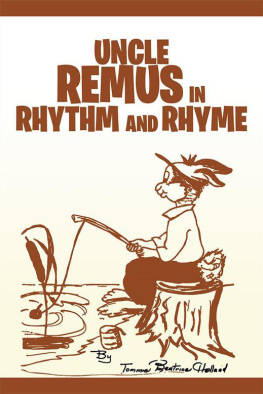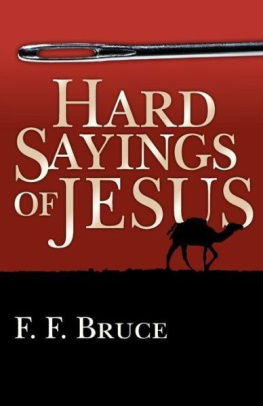Dzhoel Harris - Uncle Remus, his songs and his sayings
Here you can read online Dzhoel Harris - Uncle Remus, his songs and his sayings full text of the book (entire story) in english for free. Download pdf and epub, get meaning, cover and reviews about this ebook. year: 2000, genre: Children. Description of the work, (preface) as well as reviews are available. Best literature library LitArk.com created for fans of good reading and offers a wide selection of genres:
Romance novel
Science fiction
Adventure
Detective
Science
History
Home and family
Prose
Art
Politics
Computer
Non-fiction
Religion
Business
Children
Humor
Choose a favorite category and find really read worthwhile books. Enjoy immersion in the world of imagination, feel the emotions of the characters or learn something new for yourself, make an fascinating discovery.

- Book:Uncle Remus, his songs and his sayings
- Author:
- Genre:
- Year:2000
- Rating:3 / 5
- Favourites:Add to favourites
- Your mark:
- 60
- 1
- 2
- 3
- 4
- 5
Uncle Remus, his songs and his sayings: summary, description and annotation
We offer to read an annotation, description, summary or preface (depends on what the author of the book "Uncle Remus, his songs and his sayings" wrote himself). If you haven't found the necessary information about the book — write in the comments, we will try to find it.
Dzhoel Harris: author's other books
Who wrote Uncle Remus, his songs and his sayings? Find out the surname, the name of the author of the book and a list of all author's works by series.
Uncle Remus, his songs and his sayings — read online for free the complete book (whole text) full work
Below is the text of the book, divided by pages. System saving the place of the last page read, allows you to conveniently read the book "Uncle Remus, his songs and his sayings" online for free, without having to search again every time where you left off. Put a bookmark, and you can go to the page where you finished reading at any time.
Font size:
Interval:
Bookmark:
Uncle Remus: His Songs and His Sayings
By Joel Chandler Harris
PREFACE AND DEDICATION TO THE NEW EDITION
To Arthur Barbette Frost:
DEAR FROST:
I am expected to supply a preface for this new edition of my first bookto advance from behind the curtain, as it were, and make a fresh bow to the public that has dealt with Uncle Remus in so gentle and generous a fashion. For this event the lights are to be rekindled, and I am expected to respond in some formal way to an encore that marks the fifteenth anniversary of the book. There have been other editionshow many I do not rememberbut this is to be an entirely new one, except as to the matter: new type, new pictures, and new binding.
But, as frequently happens on such occasions, I am at a loss for a word. I seem to see before me the smiling faces of thousands of childrensome young and fresh, and some wearing the friendly marks of age, but all children at heartand not an unfriendly face among them. And out of the confusion, and while I am trying hard to speak the right word, I seem to hear a voice lifted above the rest, saying "You have made some of us happy." And so I feel my heart fluttering and my lips trembling, and I have to how silently and him away, and hurry back into the obscurity that fits me best.
Phantoms! Children of dreams! True, my dear Frost; but if you could see the thousands of letters that have come to me from far and near, and all fresh from the hearts and hands of children, and from men and women who have not forgotten how to be children, you would not wonder at the dream. And such a dream can do no harm. Insubstantial though it may be, I would not at this hour exchange it for all the fame won by my mightier brethren of the penwhom I most humbly salute.
Measured by the material developments that have compressed years of experience into the space of a day, thus increasing the possibilities of life, if not its beauty, fifteen years constitute the old age of a book. Such a survival might almost be said to be due to a tiny sluice of green sap under the gray bark. where it lies in the matter of this book, or what its source if, indeed, it be really thereis more of a mystery to my middle age than it was to my prime.
But it would be no mystery at all if this new edition were to be more popular than the old one. Do you know why? Because you have taken it under your hand and made it yours. Because you have breathed the breath of life into these amiable brethren of wood and field. Because, by a stroke here and a touch there, you have conveyed into their quaint antics the illumination of your own inimitable humor, which is as true to our sun and soil as it is to the spirit and essence of the matter set forth.
The book was mine, but now you have made it yours, both sap and pith. Take it, therefore, my dear Frost, and believe me, faithfully yours,
Joel Chandler Harris
INTRODUCTION
I am advised by my publishers that this book is to be included in their catalogue of humorous publications, and this friendly warning gives me an opportunity to say that however humorous it may be in effect, its intention is perfectly serious; and, even if it were otherwise, it seems to me that a volume written wholly in dialect must have its solemn, not to say melancholy, features. With respect to the Folk-Lore scenes, my purpose has been to preserve the legends themselves in their original simplicity, and to wed them permanently to the quaint dialectif, indeed, it can be called a dialectthrough the medium of which they have become a part of the domestic history of every Southern family; and I have endeavored to give to the whole a genuine flavor of the old plantation.
Each legend has its variants, but in every instance I have retained that particular version which seemed to me to be the most characteristic, and have given it without embellishment and without exaggeration.
The dialect, it will be observed, is wholly different from that of the Hon. Pompey Smash and his literary descendants, and different also from the intolerable misrepresentations of the minstrel stage, but it is at least phonetically genuine. Nevertheless, if the language of Uncle Remus fails to give vivid hints of the really poetic imagination of the negro; if it fails to embody the quaint and homely humor which was his most prominent characteristic; if it does not suggest a certain picturesque sensitivenessa curious exaltation of mind and temperament not to be defined by wordsthen I have reproduced the form of the dialect merely, and not the essence, and my attempt may be accounted a failure. At any rate, I trust I have been successful in presenting what must be, at least to a large portion of American readers, a new and by no means unattractive phase of negro charactera phase which may be considered a curiously sympathetic supplement to Mrs. Stowe's wonderful defense of slavery as it existed in the South. Mrs. Stowe, let me hasten to say, attacked the possibilities of slavery with all the eloquence of genius; but the same genius painted the portrait of the Southern slave-owner, and defended him.
A number of the plantation legends originally appeared in the columns of a daily newspaperThe Atlanta Constitution and in that shape they attracted the attention of various gentlemen who were kind enough to suggest that they would prove to be valuable contributions to myth-literature. It is but fair to say that ethnological considerations formed no part of the undertaking which has resulted in the publication of this volume. Professor J. W. Powell, of the Smithsonian Institution, who is engaged in an investigation of the mythology of the North American Indians, informs me that some of Uncle Remus's stories appear in a number of different languages, and in various modified forms, among the Indians; and he is of the opinion that they are borrowed by the negroes from the red-men. But this, to say the least, is extremely doubtful, since another investigator (Mr. Herbert H. Smith, author of Brazil and the Amazons) has met with some of these stories among tribes of South American Indians, and one in particular he has traced to India, and as far east as Siam. Mr. Smith has been kind enough to send me the proof-sheets of his chapter on The Myths and Folk-Lore of the Amazonian Indians, in which he reproduces some of the stories which he gathered while exploring the Amazons.
In the first of his series, a tortoise falls from a tree upon the head of a jaguar and kills him; in one of Uncle Remus's stories, the terrapin falls from a shelf in Miss Meadows's house and stuns the fox, so that the latter fails to catch the rabbit. In the next, a jaguar catches a tortoise by the hind-leg as he is disappearing in his hole; but the tortoise convinces him he is holding a root, and so escapes; Uncle Remus tells how the fox endeavored to drown the terrapin, but turned him loose because the terrapin declared his tail to be only a stump-root. Mr. Smith also gives the story of how the tortoise outran the deer, which is identical as to incident with Uncle Remus's story of how Brer Tarrypin outran Brer Rabbit. Then there is the story of how the tortoise pretended that he was stronger than the tapir. He tells the latter he can drag him into the sea, but the tapir retorts that he will pull the tortoise into the forest and kill him besides. The tortoise thereupon gets a vine-stem, ties one end around the body of the tapir, and goes to the sea, where he ties the other end to the tail of a whale. He then goes into the wood, midway between them both, and gives the vine a shake as a signal for the pulling to begin. The struggle between the whale and tapir goes on until each thinks the tortoise is the strongest of animals. Compare this with the story of the terrapin's contest with the bear, in which Miss Meadows's bed-cord is used instead of a vine-stem. One of the most characteristic of Uncle Remus's stories is that in which the rabbit proves to Miss Meadows and the girls that the fox is his riding-horse. This is almost identical with a story quoted by Mr. Smith, where the jaguar is about to marry the deer's daughter. The cotiaa species of rodentis also in love with her, and he tells the deer that he can make a riding-horse of the jaguar.
Font size:
Interval:
Bookmark:
Similar books «Uncle Remus, his songs and his sayings»
Look at similar books to Uncle Remus, his songs and his sayings. We have selected literature similar in name and meaning in the hope of providing readers with more options to find new, interesting, not yet read works.
Discussion, reviews of the book Uncle Remus, his songs and his sayings and just readers' own opinions. Leave your comments, write what you think about the work, its meaning or the main characters. Specify what exactly you liked and what you didn't like, and why you think so.









